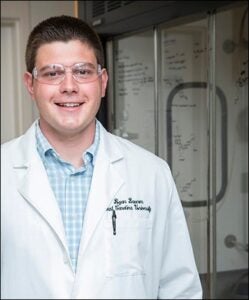January 26, 2015
Applying for Research Funding
 By: Ryan Baucom, EC Scholar and Honors College Senior
By: Ryan Baucom, EC Scholar and Honors College Senior
As an Honors College student, you are required to complete a senior honors project before graduation. I have been working in the organic chemistry lab of Dr. Allen for the past year on a peptide synthesis project. Essentially, I have synthesized an amino acid that should have an affinity for certain metal ions such as copper ions. My project aims to insert these novel amino acids into peptide sequences and then examine how the peptide chains interact with one another. One of the leading theories behind Alzheimer’s and other neurodegenerative diseases is that certain proteins that function normally aggregate and then do not function normally. One theory as to how the peptides aggregate is that they bind to copper ions, which cause the aggregation. If my novel amino acid is successful, one will be able to insert it into any known peptide chain and observe whether the chain then aggregates, as it will be interacting with copper ions. This would help strengthen the argument that copper ions cause the aggregation of prion proteins.
After working in an organic chemistry laboratory for a year, I have realized how expensive laboratory research can be. Some of the compounds needed for my reactions or the solvents used in analysis can cost hundreds of dollars or more. In order to help fund my project, I decided to look for grants and other funding sources. The Honors College has recently created the Scholarly Activity Awards for Students (SAAS). This is a funding source that only honors students may apply for and it funds research, innovation projects, publication fees, or conference registration fees. I recently applied for research materials through this fund and I was awarded $398 to buy multiple solvents and amino acids for my project. Through this initiative students may receive up to $400 for one of the four funding categories. There are three deadlines throughout the year for this award including: March 15, July 15, and November 15.
Other sources of funding on campus include travel funds through the office of Undergraduate Research and the Undergraduate Research and Creative Activity (URCA) Awards. Recently I applied for a travel fund to support my travel to the 249th National ACS Meeting in Denver, CO where I will be presenting my senior honors project. I was awarded up to $350 dollars to be applied to travel, lodging, registration fees, and/or meals. This award requires that I initially spend the money myself and will be reimbursed after proper documentation is provided following the trip. The URCA awards are available twice a year and can provide up to $2500 including a stipend if desired. These awards fund undergraduate research on campus and require that students present a poster at Research and Creative Achievement Week on ECU’s campus in the spring.
Certain departments on campus, such as the Chemistry Department, also have funds that students may apply for to help offset research costs. I recently applied for a Chemistry Undergraduate Research Experience (CURE) award through the Chemistry department and was provided approximately $1200 to help fund my research. Students should check with their individual departments to inquire about research funding. Other grants are available outside of ECU’s campus, but are more competitive as they are usually open nationwide. Students should apply for all funding opportunities that are available to them, as it will increase their chances of receiving an award. Undergraduate research is a wonderful opportunity, and although it can be costly, there are multiple sources of funding here at East Carolina University to provide undergraduates with this wonderful experience.
